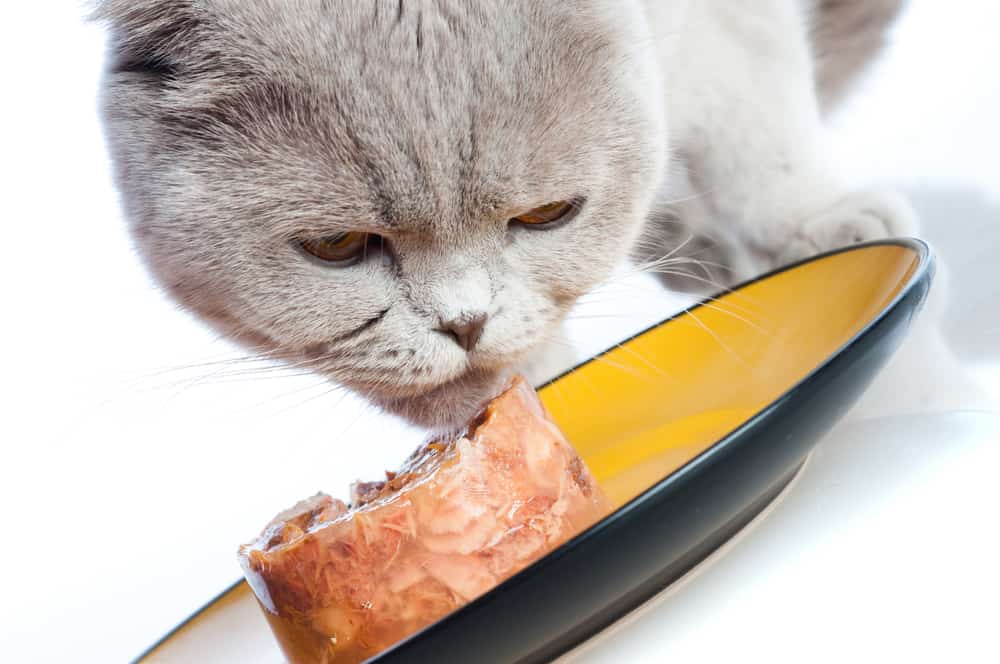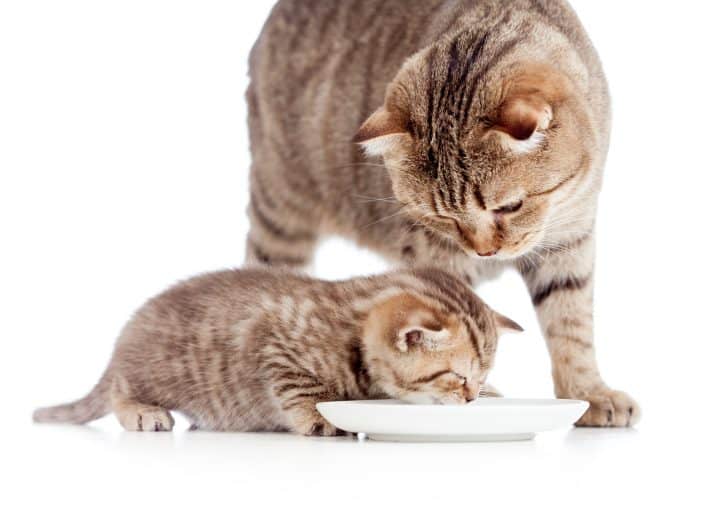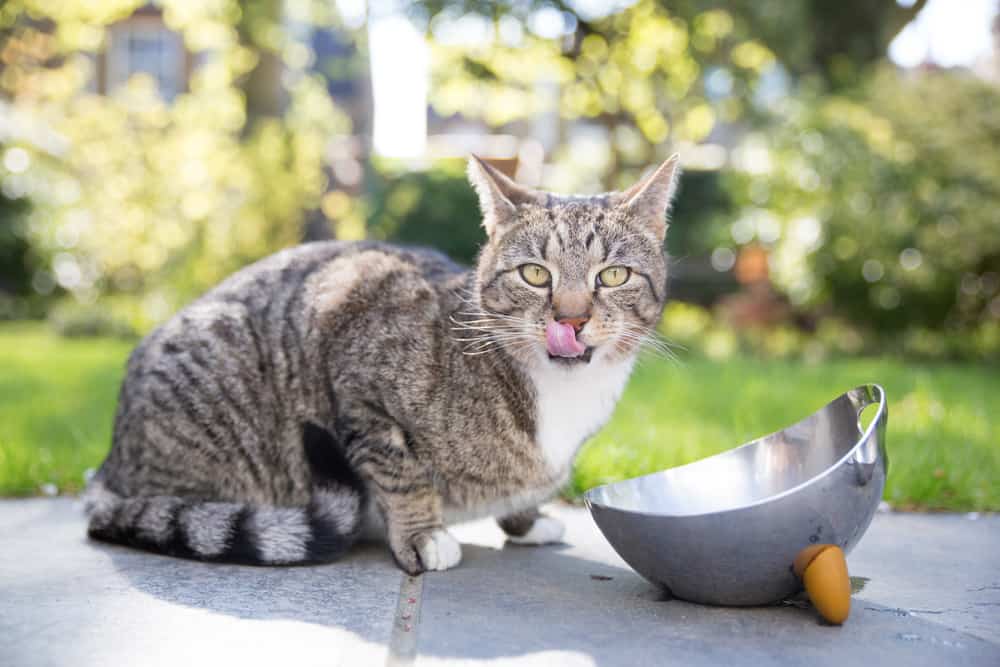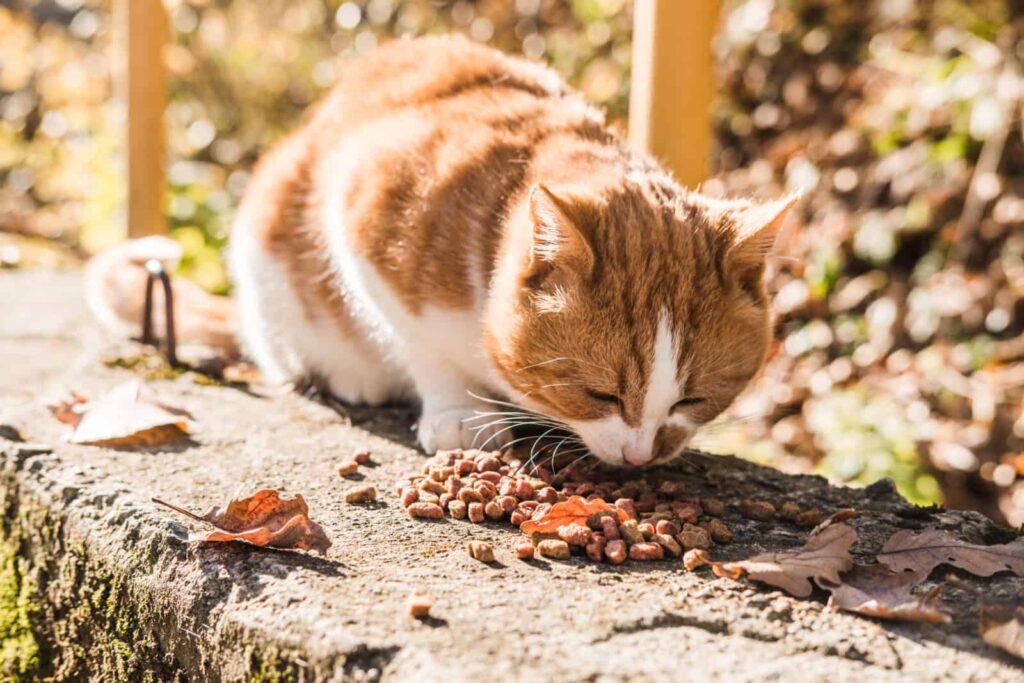I am sure all cat owners know they shouldn’t give human food to their feline companions. But, many pet parents treat this issue as a gray area.
Many of my acquaintances sometimes share some of their meat meals with their cats, like – sausages. Since cats are obligate carnivores, a sausage once now and then can’t do any harm to our cats, right?
I would disagree. I do not give my cat sausage, and I would like to advise all of you to do the same. It is not a good idea to give our cats human food, especially foods such as sausages.
The truth is – sausages are not likely to kill your cat – but, your cat will neither benefit from eating this type of food.
Now, let’s see why sausages are not good food for cats.
1. Dangers Of Spices And Seasonings For Cats
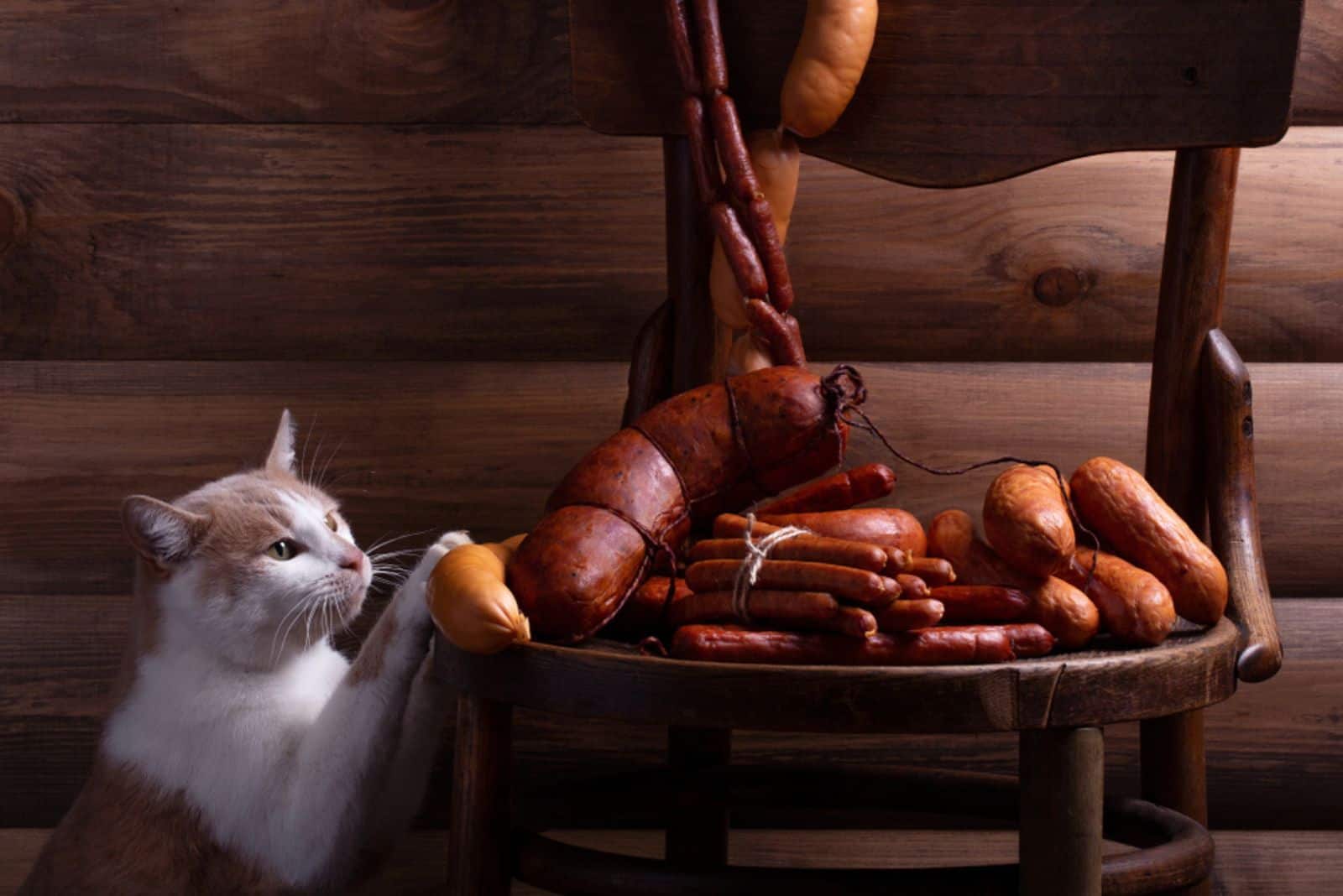
Sausages are spicy food – this is the reason why they are so delicious to us! They also might be delicious to our cats, but cats should not consume spicy food.
Sausages are a salty food, and too much salt can cause dehydration in cats. Also, cats have delicate kidneys, and this is another reason why they should not eat salty food.
Salt can be so bad for cats that it can even cause poisoning that manifests in excessive thirst, frequent peeing, diarrhea, vomiting, and lethargy.
Together with salt, sausages will usually contain some other spices and seasoning, such as garlic.
According to a study published in the Journal of Venomous Animals and Toxins including Tropical Diseases [1], the ingestion of Allium species can cause toxication in cats. The Allium species refer to flowering plants such as scallions, onion, leek, and garlic.
Of course, this does not mean that a single sausage contains enough garlic to cause toxication of your cat. But, why risk it?
If your cat likes the taste of sausage, you two sharing this tasty meal might become a habit. In the long run, this might negatively impact your cat’s health and lifespan.
2. Unhealthy Fats
Sausages have high fat content. This is not alarming for an adult person, of course, not even for those who are rather skinny.
However, an average domesticated cat, weighing from 6 to 12 pounds, certainly does not need food so high in fats. I repeat once again – a piece of sausage from time to time will not cause obesity in your cat – but, many cat owners might not even notice when they cross the line.
Obesity in domestic cats is a severe problem nowadays. According to a study published in the journal Veterinarni Medicina [2], up to 63% of domestic cats are obese nowadays, which is a number that causes concern in all feline fanciers.
Every cat owner should act responsibly to prevent their cat developing obesity. One of the crucial steps here is to avoid giving human food to cats, especially food high in fats – such as sausages.
3. Added Preservatives Are Also A Big No
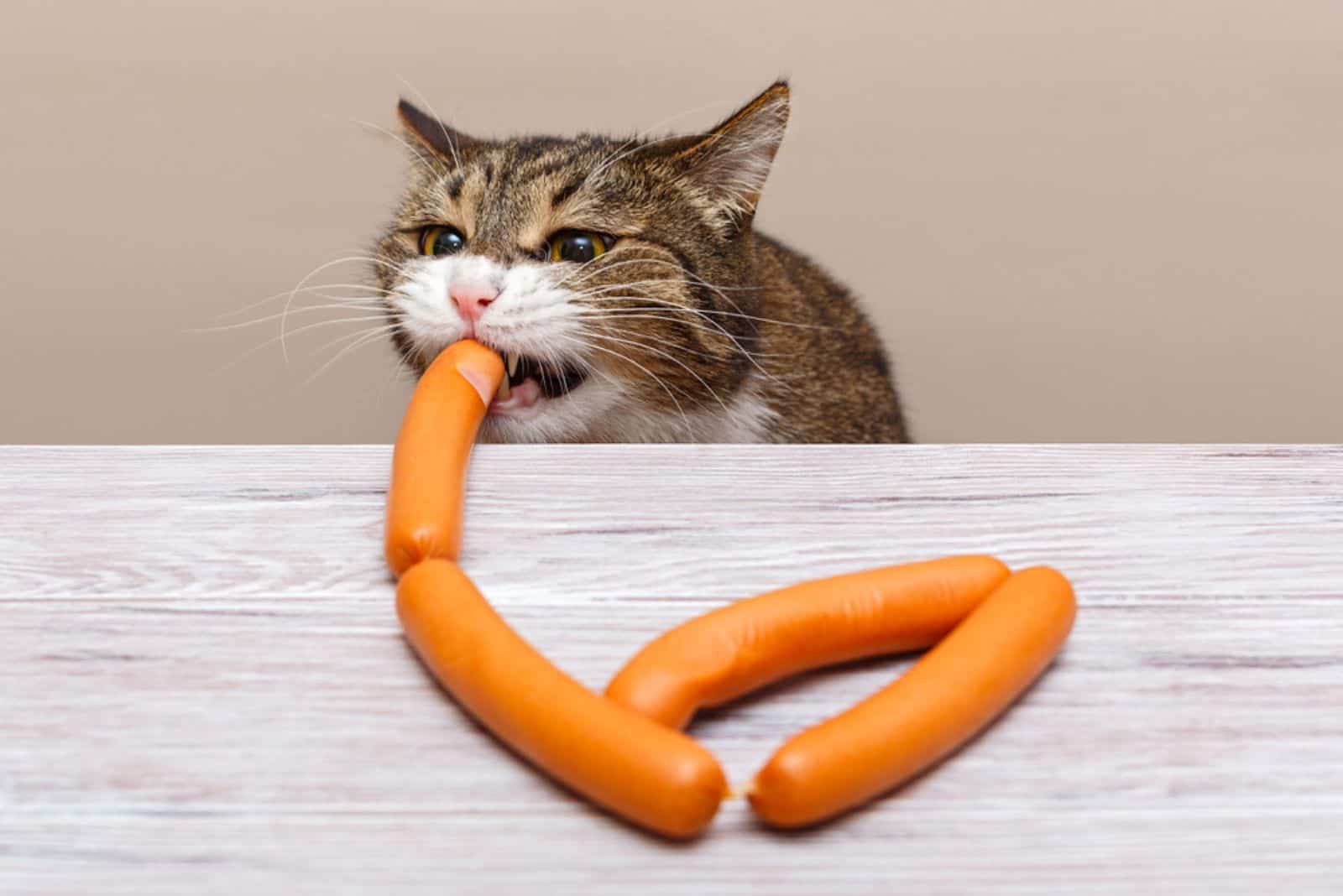
Many people will give their cats sausages simply because they are carnivores, and sausages are meat. So, how can meat be so bad for cats?
Well, sausages are not only made of meat, at least most of them are not. Most sausages also contain preservatives, such as nitrites and phosphates which are used to extend the freshness of sausages.
Some sausages might also contain smaller amounts of sugar. Sugar is not toxic for cats, but, this does not mean that you should let your cat eat foods rich in sugar, such as cheesecake.
Of course, sausages are far away from cheesecake if we compare their sugar content, but, once again I would not recommend you to create a habit of sausage eating in your cat.
Sugar, as well as other preservatives mentioned above, have no nutritional value for cats. All cat owners should be aware that sausages are usually not pure meat, and, therefore, their cats should not eat them, especially not too often.
4. Digestive Issues
Since sausages contain spices, fats, and preservatives potentially, there is a chance that a cat will develop digestive problems after eating a sausage.
Many cats will have problems digesting foods such as sausages.
These problems might not be serious; perhaps your cat will have diarrhea, but will seem fine. The diarrhea should stop within 24 hours, and, if it stops, you won’t even have to contact a vet. This is only a response of the cat's body to a food that is not the best option for her.
Also, your cat might vomit after eating sausage. If this is the case, you should try some home remedies for cat vomiting; fluids, keeping your cat hydrated, and giving her some ginger tea.
Cat vomiting or having diarrhea does not sound like a serious health issue, but, why give any type of food that might cause these consequences in your feline friend?
5. Raw Sausages Are Also Risky

Some cat owners will perhaps consider giving their cats raw sausages. But, this is certainly not a good idea.
Raw sausages can contain bacteria such as Salmonella, which can cause dehydration, vomiting, diarrhea, and weight loss in cats. Cats can transmit this bacteria on humans, which is why cat owners should be very careful about the food they give their pets.
Journal of Clinical Microbiology published a study [3] whose results showed how raw food is a major risk factor for Salmonella infection in dogs and cats.
Therefore, cat owners should not give their pets raw food; if you would still like to give your cat sausage occasionally, be sure you cook it beforehand.
So… The Best Solution Is No Sausages At All For Cats?
Sausages are a type of food that are not even healthy for us. But, I suppose all of us will have a piece of them now and then.
One thing is sure – they are super tasty! We know this, but every cat that has ever tasted sausage also knows this.
The video below shows how a kitten enjoys eating a tasty sausage.
Obviously, this cat is crazy about sausages! I understand why cat owners would like to know if there is a way for their cat to still enjoy a piece of sausage, at least from time to time.
Seeing our pets enjoying some food so much will make it hard for all of us to deprive them of a pleasure like this.
If you consider giving your cat sausage, you should pay attention to the food label. Make sure that this sausage does not have any preservatives.
Also, most people probably choose pork or beef sausages, but, if you want to choose a less harmful option for your cat, then a chicken sausage will be a good idea. The chicken sausage has less fats and will be better for your cat’s sensitive stomach.
Furthermore, you should cook the sausage for your cat instead of giving raw sausage to her. Additionally, you can always consult your vet whether there is some cat food that tastes similar to sausage – this is something your cat will certainly like!
Final Words
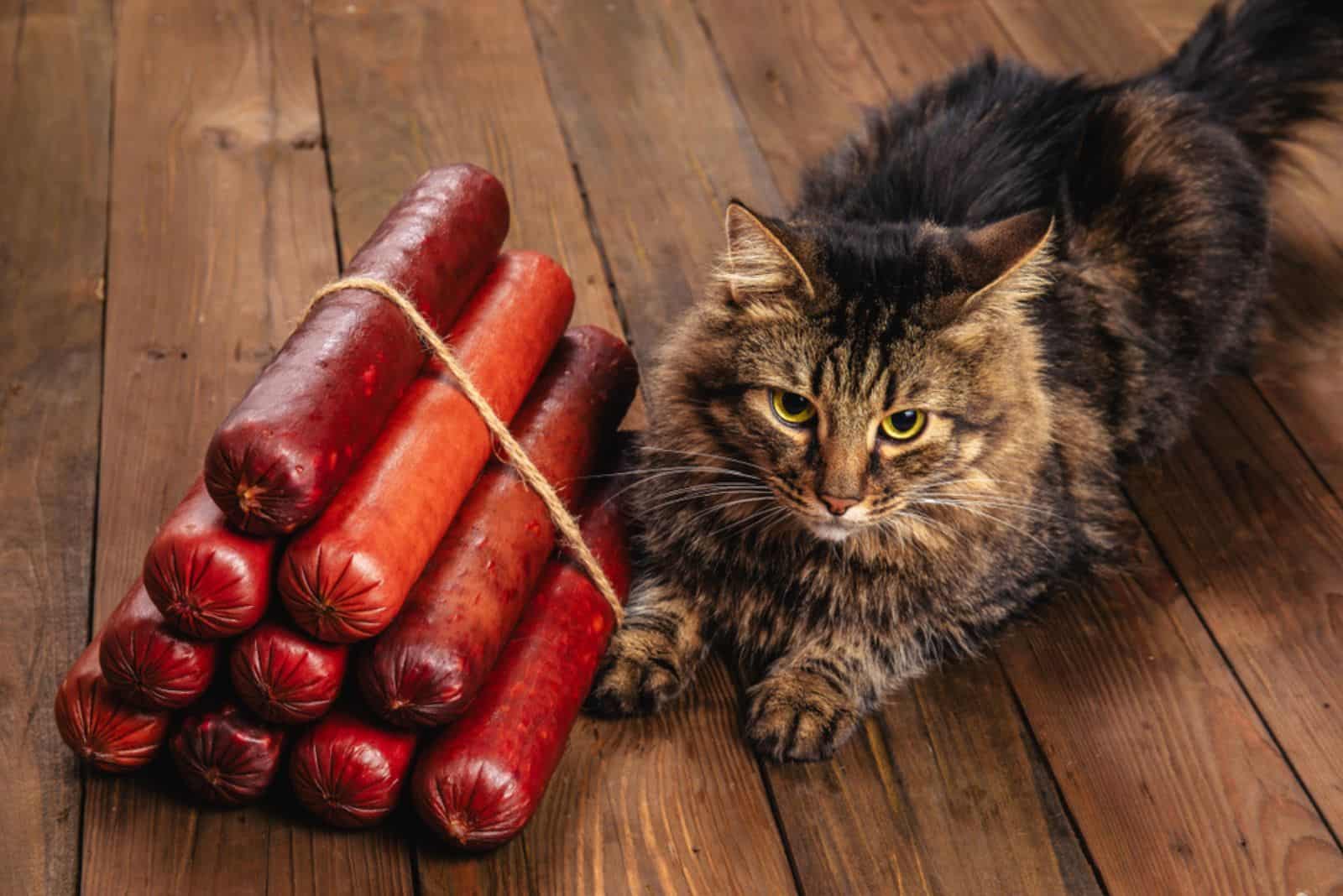
I don’t want to scare out cat parents that occasionally share a sausage with their feline friends.
If your cat does not consume sausage regularly, there is a low chance for any kind of digestive problems or bacteria development.
You should stick with regular cat food to keep your cat at a healthy weight. If you would still like to cheer up your kitten with a tasty sausage occasionally, make sure you only give her cooked sausages.
Small piece of sausage is not likely to cause any problems in your cat, so, try finding the perfect balance to make your cat happy, but to also take good care of her health at the same time.
References:
[1] Salgado BS, Monteiro LN, Rocha NS: Allium species poisoning in dogs and cats. The Journal of Venomous Animals and Toxins including Tropical Diseases, 2017: 17(1) 4-11. DOI, Retrieved March 9, 2023. [2] Tarkosova, D, Story, MM, Rand, JS, Svoboda, M: Feline obesity – prevalence, risk factors, pathogenesis, associated conditions and assessment: a review. Veterinarni Medicina, 61, 2016 (6): 295–307. DOI, Retrieved March 9, 2023. [3] Reimschuessel, R, et.al. Multilaboratory Survey To Evaluate Salmonella Prevalence in Diarrheic and Nondiarrheic Dogs and Cats in the United States between 2012 and 2014. Journal of Clinical Microbiology, Vol. 55, No. 5, DOI, Retrieved March 10, 2023.Read Next: Can Cats Eat Jello And Potential Benefits And Risks


